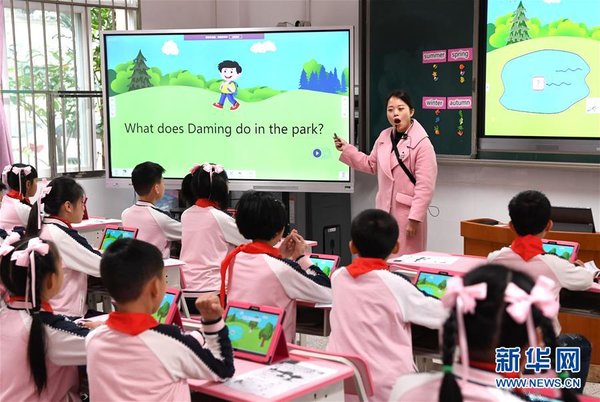Chinese children's study journey to the West
- By Wu Jin
 0 Comment(s)
0 Comment(s) Print
Print E-mail China.org.cn, July 2, 2019
E-mail China.org.cn, July 2, 2019
It might be a childhood memory for many young Chinese parents when they marked English words with Chinese characters not for equivalent meanings but for the similarity in sounds. They did so in an attempt to memorize the pronunciations at the start of learning the language.

At that time, foreign linguistic education did not start until pupils attended senior primary school classes. And for some schools, English teaching wasn't even present on the curriculum.
Some 30 years later, it's that generation's own children who are now learning English. Embarking on the task at comparatively younger ages, usually between three to six, those children tend to attend extracurricular classes, like Education First, or online training programs, such as, VIP Kids, which are taught by teachers all from English-speaking countries. It would not be surprising if they tended to sneer at parental accented spoken language.
A survey conducted by China.org.cn on children's early international education drew 28 respondents from Beijing, the Inner Mongolia autonomous region and Henan province. The result showed that in 22 cases, the parents sent their children to extracurricular English-learning classes, hoping they can quickly become familiar with the language, speak with the right pronunciation and experience a different cultural atmosphere.
Yet, language classes are no longer the only option for Chinese parents to nudge their children towards a Western education. Sports, like football in various forms , ice hockey and equestrianism, also exert growing influence.
Mu, mother of a three-and-half-year-old, recently brought her son to a pitch at Haidian Park in northwest Beijing, to attend a trial class organized by Great Stone Gridiron (GSG), an America-based football development company. She hoped the game could strengthen her son in body and mind.
According to her, both she and her son had an opportunity to watch an ice hockey game held in Canada where she spent the whole of last year as an exchange scholar.
"Canadians who are amiable and well-educated demonstrated completely different characteristics in that match. I was so impressed by their competitive spirit that I hope my son can develop his personality, hopefully enabling him to be involved in team games faster," she said.
Vladimir Mytrofanov, the foreign coach of GSG in China, said, "some of the key ideas in American football are discipline, teamwork and physical strength. I can't say that coaching kids is an easy job because it takes a lot of energy and effort. However, I hope I'll help them to grow up strong, disciplined, successful and healthy."
According to Zhang Lei, GSG's Chinese coach, the children cannot help but feel excited when they encounter a coach who speaks different language and shows a different approach to training.
"In the beginning, children were curious about Mytrofanov's big mustache and usually came up to touch it," Zhang recalled. "However, he never feels offended because our principle is to treat children like children even in energy-consuming training."
To establish intimate and amicable relations between children and adults was not a mainstream rearing approach in Western society in the past, especially among the aristocratic classes.
However, according to Zhao Xiaohua, founder of the Wechat account --the "Parent-Children English learning classes," it was not until more recent times when researchers found the overarching importance of satisfying children's intuitive demand for love while bringing them up.
The theories extending from West to East now dominate the educational mechanism. Yet, this is not the first time that moderately wealthy Chinese families have sought to create opportunities for their children to learn from the West.
Historically speaking, the powerful drive for involvement in international education prevails almost every phase of China's modernization drive.
More than a century ago, the Westernization drive initiated in late Qing Dynasty (1644-1911) provided access for young Chinese both at home and abroad to the knowledge of Western society. Prominent figures emerged, like Zhan Tianyou, the pioneering Chinese railroad engineer, Hu Shih, the advocate of vernacular Chinese, and Lin Yutang, a nominee for the Nobel Prize in Literature for his English writings about China.
Their assimilation of different cultures established a model for today's children. According to the survey previously mentioned, almost all parents agree that their children should receive both a domestic and international education.
Meanwhile, seven respondents said their children divided their time equally when studying both Chinese and English. However, more parents said they required their children to spend more time on Chinese education.
According to Zhao, Chinese people are increasingly confident about their own culture and eager to introduce China to the world. However, the latter requires the comprehension of the essence of different cultures.
"We need to know what happens in the world, what factors distinguish Chinese culture from those of the rest of the world and how foreign people look at us. The more we know, the more confident we can feel," she said.






Go to Forum >>0 Comment(s)